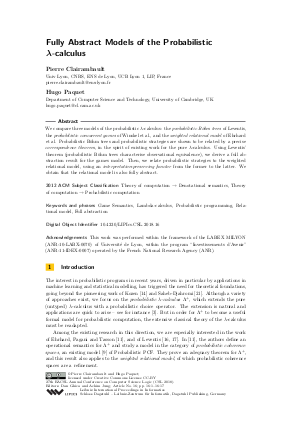Fully Abstract Models of the Probabilistic lambda-calculus
Authors Pierre Clairambault, Hugo Paquet
-
Part of:
Volume:
27th EACSL Annual Conference on Computer Science Logic (CSL 2018)
Part of: Series: Leibniz International Proceedings in Informatics (LIPIcs)
Part of: Conference: Computer Science Logic (CSL) - License:
 Creative Commons Attribution 3.0 Unported license
Creative Commons Attribution 3.0 Unported license
- Publication Date: 2018-08-29
File

PDF
LIPIcs.CSL.2018.16.pdf
- Filesize: 0.58 MB
- 17 pages
Document Identifiers
Subject Classification
ACM Subject Classification
- Theory of computation → Denotational semantics
- Theory of computation → Probabilistic computation
Keywords
- Game Semantics
- Lambda-calculus
- Probabilistic programming
- Relational model
- Full abstraction
Metrics
- Access Statistics
-
Total Accesses (updated on a weekly basis)
0PDF Downloads0Metadata Views
Abstract
We compare three models of the probabilistic lambda-calculus: the probabilistic Böhm trees of Leventis, the probabilistic concurrent games of Winskel et al., and the weighted relational model of Ehrhard et al. Probabilistic Böhm trees and probabilistic strategies are shown to be related by a precise correspondence theorem, in the spirit of existing work for the pure lambda-calculus. Using Leventis' theorem (probabilistic Böhm trees characterise observational equivalence), we derive a full abstraction result for the games model. Then, we relate probabilistic strategies to the weighted relational model, using an interpretation-preserving functor from the former to the latter. We obtain that the relational model is also fully abstract.
Cite As Get BibTex
Pierre Clairambault and Hugo Paquet. Fully Abstract Models of the Probabilistic lambda-calculus. In 27th EACSL Annual Conference on Computer Science Logic (CSL 2018). Leibniz International Proceedings in Informatics (LIPIcs), Volume 119, pp. 16:1-16:17, Schloss Dagstuhl – Leibniz-Zentrum für Informatik (2018)
https://doi.org/10.4230/LIPIcs.CSL.2018.16
BibTex
@InProceedings{clairambault_et_al:LIPIcs.CSL.2018.16,
author = {Clairambault, Pierre and Paquet, Hugo},
title = {{Fully Abstract Models of the Probabilistic lambda-calculus}},
booktitle = {27th EACSL Annual Conference on Computer Science Logic (CSL 2018)},
pages = {16:1--16:17},
series = {Leibniz International Proceedings in Informatics (LIPIcs)},
ISBN = {978-3-95977-088-0},
ISSN = {1868-8969},
year = {2018},
volume = {119},
editor = {Ghica, Dan R. and Jung, Achim},
publisher = {Schloss Dagstuhl -- Leibniz-Zentrum f{\"u}r Informatik},
address = {Dagstuhl, Germany},
URL = {https://drops.dagstuhl.de/entities/document/10.4230/LIPIcs.CSL.2018.16},
URN = {urn:nbn:de:0030-drops-96835},
doi = {10.4230/LIPIcs.CSL.2018.16},
annote = {Keywords: Game Semantics, Lambda-calculus, Probabilistic programming, Relational model, Full abstraction}
}
Author Details
References
-
Patrick Baillot, Vincent Danos, Thomas Ehrhard, and Laurent Regnier. Timeless games. In International Workshop on Computer Science Logic, pages 56-77. Springer, 1997.

-
Hendrik Pieter Barendregt. The lambda calculus, volume 2. North-Holland Amsterdam, 1984.

- Johannes Borgström, Ugo Dal Lago, Andrew D. Gordon, and Marcin Szymczak. A Lambda-Calculus Foundation for Universal Probabilistic Programming. CoRR, abs/1512.08990, 2015. URL: http://arxiv.org/abs/1512.08990.
-
Antonio Bucciarelli, Thomas Ehrhard, and Giulio Manzonetto. Not enough points is enough. In International Workshop on Computer Science Logic, pages 298-312. Springer, 2007.

-
Simon Castellan, Pierre Clairambault, Hugo Paquet, and Glynn Winskel. The Concurrent Game Semantics of Probabilistic PCF. In Logic in Computer Science (LICS), 2018 33rd Annual ACM/IEEE Symposium on, page to appear. ACM/IEEE, 2018.

-
Simon Castellan, Pierre Clairambault, and Glynn Winskel. Symmetry in Concurrent Games. In Proceedings of the Joint Meeting of the Twenty-Third EACSL Annual Conference on Computer Science Logic (CSL) and the Twenty-Ninth Annual ACM/IEEE Symposium on Logic in Computer Science (LICS), page 28. ACM, 2014.

-
Simon Castellan, Pierre Clairambault, and Glynn Winskel. The Parallel Intensionally Fully Abstract Games Model of PCF. In Logic in Computer Science (LICS), 2015 30th Annual ACM/IEEE Symposium on, pages 232-243. IEEE, 2015.

- Simon Castellan, Pierre Clairambault, and Glynn Winskel. Concurrent hyland-ong games. arXiv, 2016. URL: http://arxiv.org/abs/1409.7542.
-
Vincent Danos and Thomas Ehrhard. Probabilistic coherence spaces as a model of higher-order probabilistic computation. Information and Computation, 209(6):966-991, 2011.

-
Vincent Danos and Russell S Harmer. Probabilistic game semantics. ACM Transactions on Computational Logic (TOCL), 3(3):359-382, 2002.

-
Thomas Ehrhard, Michele Pagani, and Christine Tasson. The computational meaning of probabilistic coherence spaces. In Logic in Computer Science (LICS), 2011 26th Annual IEEE Symposium on, pages 87-96. IEEE, 2011.

-
J Martin E Hyland and C-HL Ong. On full abstraction for PCF: I, II, and III. Information and computation, 163(2):285-408, 2000.

-
Andrew D Ker, Hanno Nickau, and C-H Luke Ong. Innocent game models of untyped λ-calculus. Theoretical Computer Science, 272(1-2):247-292, 2002.

-
Dexter Kozen. Semantics of probabilistic programs. In Foundations of Computer Science, 1979., 20th Annual Symposium on, pages 101-114. IEEE, 1979.

-
Jim Laird, Giulio Manzonetto, Guy McCusker, and Michele Pagani. Weighted relational models of typed lambda-calculi. In Proceedings of the 2013 28th Annual ACM/IEEE Symposium on Logic in Computer Science, pages 301-310. IEEE Computer Society, 2013.

-
Thomas Leventis. Probabilistic lambda-theories. PhD thesis, Aix-Marseille Université, 2016.

-
Thomas Leventis. Probabilistic Böhm Trees and Probabilistic Separation. In Logic in Computer Science (LICS), 2018 33rd Annual ACM/IEEE Symposium on. ACM/IEEE, 2018.

-
Paul-André Mellies. Categorical semantics of linear logic. Panoramas et syntheses, 27:15-215, 2009.

-
Paul-André Mellies and Samuel Mimram. Asynchronous games: innocence without alternation. In International Conference on Concurrency Theory, pages 395-411. Springer, 2007.

-
Silvain Rideau and Glynn Winskel. Concurrent strategies. In Logic in Computer Science (LICS), 2011 26th Annual IEEE Symposium on, pages 409-418. IEEE, 2011.

-
Nasser Saheb-Djahromi. Cpo’s of measures for nondeterminism. Theoretical Computer Science, 12(1):19-37, 1980.

-
Glynn Winskel. Events in Computation. PhD thesis, University of Edinburgh, 1980.

-
Glynn Winskel. Event structures with symmetry. Electronic Notes in Theoretical Computer Science, 172:611-652, 2007.

-
Glynn Winskel. Distributed probabilistic and quantum strategies. Electronic Notes in Theoretical Computer Science, 298:403-425, 2013.

